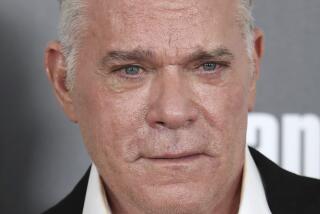THEIR STORIES DON’T END
CAREERS have been made, awards have been won, but when it comes to making a documentary, a filmmaker’s job is never finished. With the release of the academy’s documentary shortlist last month, 20 directors of 15 films received the chance to wrap up years of hard work with Oscar gold. But a word of warning for these hopefuls vying for the five final nomination slots. It doesn’t end here. After all the hoopla dies down, there is often still the matter of the living, breathing person who provided the film’s material.
When the cameras stop, many filmmakers find the relationship with their subjects goes on -- for better or worse -- sometimes for years.
Barbara Kopple says she remains on friendly terms with all of her subjects. The director of Oscar-winning documentaries “Harlan County, U.S.A.” and “American Dream,” Kopple has met many people over the years whom she now considers family. “People might write me and say, ‘My daughter is in tough shape, can you send anything’ or ‘Can you help so-and-so get a job?’ and I always do. I don’t think it is a responsibility. It is a choice and it’s a choice I would do without a doubt.”
“War/Dance” directors Sean Fine and Andrea Nix have also elected to keep in touch with their subjects. One of this year’s shortlist contenders, their documentary follows three orphans living in a displacement camp in Northern Uganda as they prepare for a contest.
Fine believes being a documentary filmmaker and keeping your subjects friends for life is something that goes hand in hand. “There is a trust that you have to build so they let you into their lives,” Fine says. “If the trust isn’t there you aren’t going to be filming their reality. Although we are working on other projects now, those three kids and all the subjects we have filmed will be part of our lives forever.”
But things don’t always go so smoothly in the filmmaker-subject relationship.
Amir Bar-Lev, whose Sundance favorite “My Kid Could Paint That” is about a child artist, found himself under attack from the girl’s parents after the film was released. Mark and Laura Olmstead, the parents of then 4-year-old painter Marla, have made statements to the media expressing their disappointment with the documentary, which chronicles the international attention Marla’s abstract paintings initially received and the controversy when doubts were cast on her abilities.
Bar-Lev’s film examines these doubts and tries to determine if Marla’s artwork is partially her parents’ doing. As a result, the Olmsteads and Bar-Lev are no longer on speaking terms. “These people were friends of mine,” Bar-Lev says. “I don’t relish putting a film into the world that people might one day tease Marla about.”
Steve James spent five years filming Arthur Agee and William Gates, two Chicago-based high school students who were striving to become professional basketball players. Hundreds of hours’ worth of footage became “Hoop Dreams,” one of the most critically acclaimed documentaries of 1994 and the 10th-highest-grossing to date.
After filming ended, James and his subjects both made the assumption that they would have regular contact, but as he puts it, “things changed.”
“They have their lives to live and you have your life and other films [to make] and other people’s lives to get drawn into but we managed to stay in touch pretty well.”
The director describes his current relationship with both men, now in their 30s, as similar to the one he has with his mother. “I don’t talk to my mom nearly enough. I recently told her I was going to make an effort to call her more regularly and I have had sporadic success with that. It’s that combination of desire and obligation with family so why would it be any different with your subjects?”
Unlike most struggling documentary filmmakers, James split the profits of “Hoop Dreams” with his subjects and their families. Initially the financial success only confused the relationship.
“People would come up to William and ask, ‘Why are you still living in Cabrini-Green, aren’t you rich?’ It was really hard for both of them to explain in a way that people didn’t think, ‘Oh, they have really been taken advantage of.’ ”
Screening the film for the subjects before its release can sometimes head off any hard feelings, the filmmakers say.
James had Arthur and William watch “Hoop Dreams” before its official release. “I firmly believe that your subjects should see the film before it’s done. Not give them editorial control but give them an opportunity to weigh in on your interpretation of their lives.”
Although “Murderball” directors Henry Alex Rubin and Dana Adam Shapiro garnered the Sundance 2005 audience award and an Oscar nomination, Rubin says that if his subjects, a group of quadriplegics who play full-contact rugby in wheelchairs, had not liked the film, he might have “re-cut it.”
“The only real reason to make a movie is to write a love letter to your subjects,” Rubin says. “They became our friends. The last thing you want to do is let your friends down.”
Christopher Igoe, who was featured in the film as one of the main subject’s best friends, says that he felt “naked” while watching “Murderball” for the first time at a Sundance theater. “It was nothing like I thought it was going to be” Igoe says. “Although I wasn’t 100% comfortable with the way I was portrayed, chances of me being 100% comfortable being exposed in a public light were zero anyway.”
Despite initially feeling uneasy about the film, Igoe says he does not regret his participation. “I am very happy I got to share the story. I think [Henry and Dana] definitely took care of me and for that I do feel an element of trust toward them. “
--
(BEGIN TEXT OF INFOBOX)
AFTER THE CREDITS ROLL
Documentary filmmakers often invest months at a time, sometimes years, tracking their subjects, getting to know them as the story takes shape. But when the film is completed, the relationships that have been forged often continue -- for better or worse.
(END TEXT OF INFOBOX)
More to Read
Only good movies
Get the Indie Focus newsletter, Mark Olsen's weekly guide to the world of cinema.
You may occasionally receive promotional content from the Los Angeles Times.






